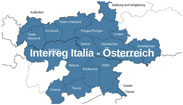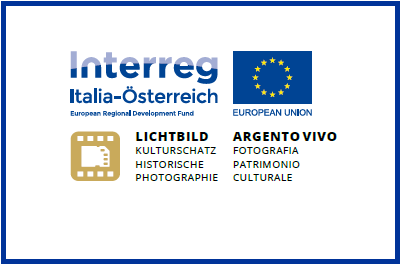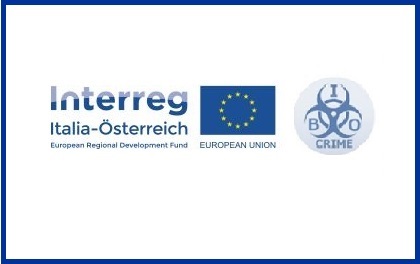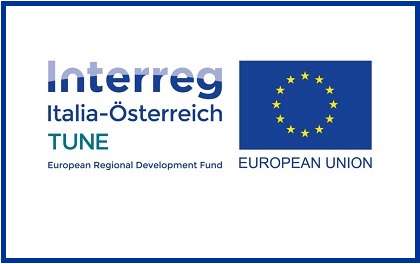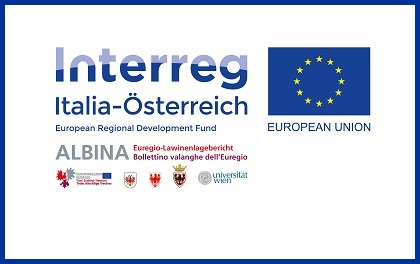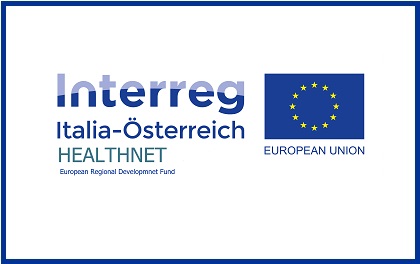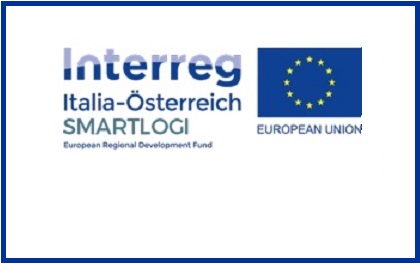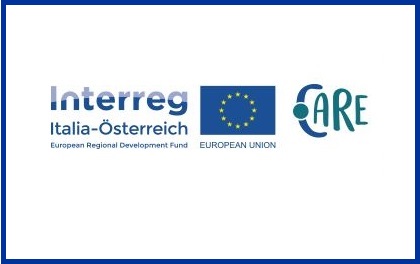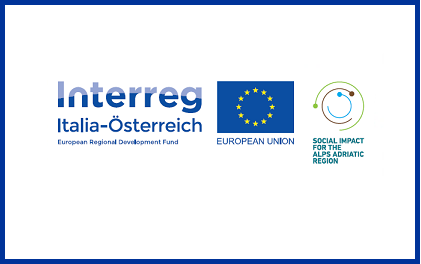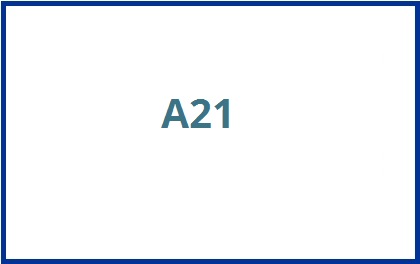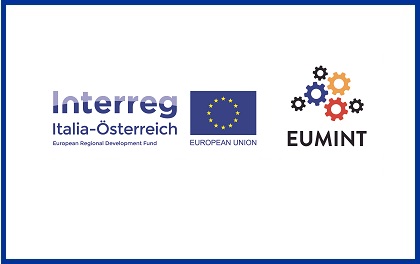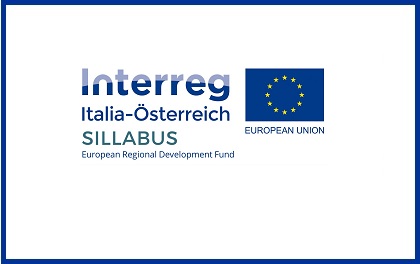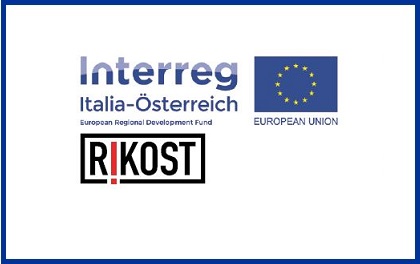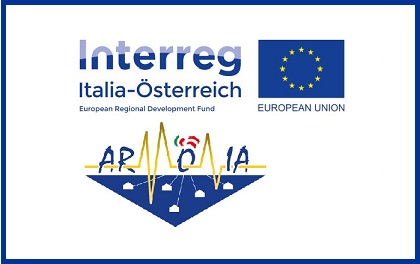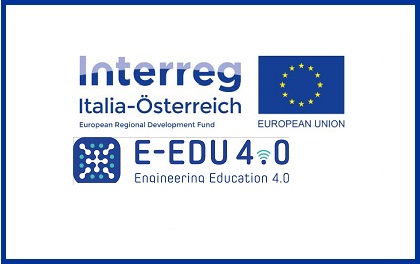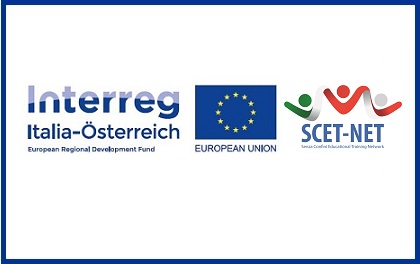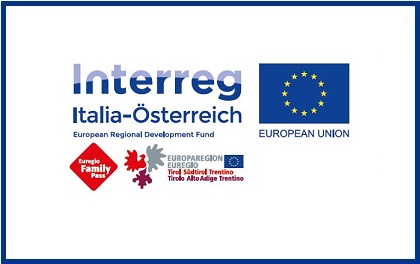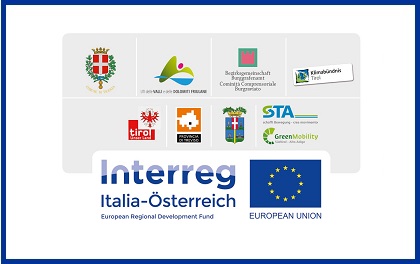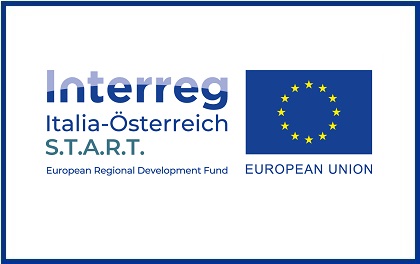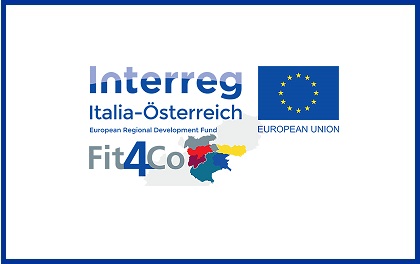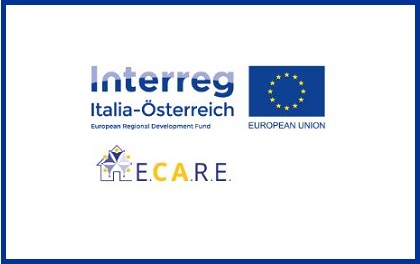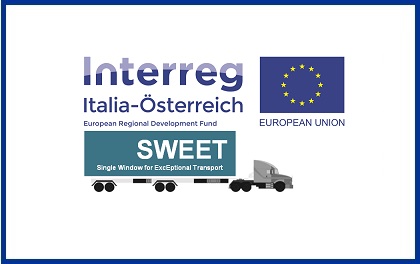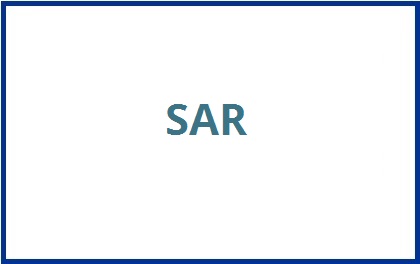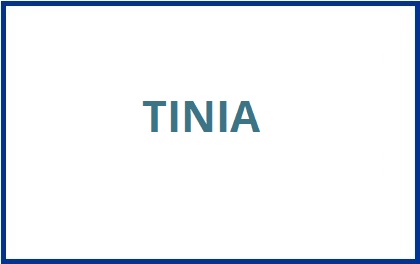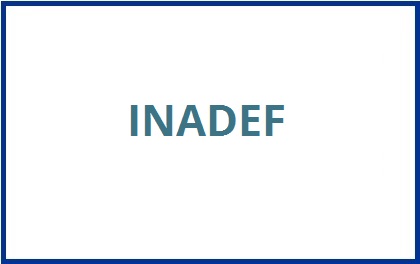Axis 3 - Institutions
Main challenges
In the Italian-Austrian border region there are still obstacles that make it difficult to grow together. These include not only language barriers but also differences in the areas of jurisdiction, administration, economy, social affairs and health. Cross-border cooperation between regional administrations and institutions rarely leads to integrated solutions and services, which leads to insufficient use of synergies. As a result, the planned activities should help to achieve a higher degree of regional integration and cross-border coordination and improve relations between neighbouring regions. This axis will focus on the following cross-border developments:
- More systematic coordination or harmonisation in legal and administrative matters, particularly in areas that have not been adequately addressed at cross-border level so far;
- Spatial and content expansion of successful pilot projects and expansion of jointly conceived projects;
- Improved governance of cross-border cooperation initiatives and thus better visibility of the results achieved.
The cooperation potential of the programme area is seen in particular in the areas of civil protection and risk prevention, public safety and rescue, local public transport, education, health and social services.
In this axis, 25 projects with a total budget of 22,933,617.76 euros were approved in three calls.
You can find the complete list of all projects financed here.
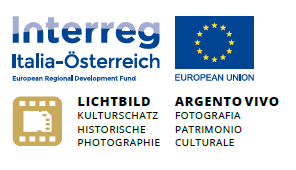 Lichtbild
Lichtbild

Lichtbild
Patrimonio fotografia. Competenza nell’utilizzo – accesso libero. Strategie innovative
For the conservation and public access of photos, measures of digitizing, preservation and archiving are be realized in the project area. Especially for people who work on a voluntary basis as chroniclers, in museums or archives and for the field of adult education, there are no specific guidelines for the handling of the digital and analogue "cultural treasure of photos" yet. Therefore, a systematic strategy for quality management and improvement is strongly needed. Through an intensive process of research and participation handouts are going to be elaborated and handed on to the target group in Tyrol and South Tyrol via workshop-modules, Online-Learning courses and consultations – as a consequent measure of knowledge transmission for the purpose of a transnational additional value of the project. Considering European, national and regional development strategies, the project also deals with the issue of Government Open Data and realizes the principle of public access to the data and meta data of the public administration and their processing mainly through Start Ups – realized for the first time ever in the field of "historical photography". The “platform photography” collects the outcome of the project (handouts, Open Data, new photo collections, virtual exhibits, app for mobile equipment). It acts as a main portal to combine knowledge of different institutions and secure it in a sustainable way for the target groups and people interested in analogue/digital photography.
Project partners
- Lead Partner (TIR) Verein Tiroler Archiv für photographische Dokumentation und Kunst
- Project partner 1 (BZ) Stadtgemeinde Bruneck
- Project partner 2 (BZ) Abteilung 14 Deutsche Kultur
- Project partner 3 (BZ) Abteilung 42 Museen
Project budgett
1.348.000,00 Euro
Project duration
01.01.2017 - 31.12.2019
Project website
 BIO-CRIME
BIO-CRIME

BIO-CRIME
Malattie trasmesse dagli animali (zoonosi) e traffico illegale di animali da compagnia/cuccioli nella regione Alpe Adria (benessere animale)
Diseases that are transmitted from animals to humans are defined as zoonoses. The spread of these diseases in the human population is often linked to human activity, and the illegal trade of pet animals is an important route of transmission of zoonoses. In fact, animals bought on the black market may come from infected areas, and not be checked from the health point of view. Friuli Venezia Giulia and Carinthia are both transit as destination routes of the illegal trade of pet animals coming from Eastern European countries. The impact of this criminal activity generates negative effects on at least 4 areas: 1. Human health, 2. Animal health & welfare, 3. Market protection, 4. Consumer fraud. The Bio-Crime Project wants to reduce the zoonotic risk through the development of a joint strategy of action, against the illegal trade of pets, as an integrated part of prevention programs relating to human health and to the health and welfare of animals. The Bio-Crime Project would like to implement certain activities in order to reduce illegal pet trade, including: 1. Training courses for public officers, 2. The development of joint operative protocols, 3. The implementation of a digital web platform for sharing data, 4. Epidemiological surveillance of the confiscated animals, 5. Education projects of the citizens of the two Regions.
Project partners
- Lead Partner (FVG) Regione autonoma Friuli Venezia Giulia-Direzione centrale salute, integrazione sociosanitaria, politiche sociali e famiglia
- Project partner 1 (FVG) Consorzio per l'area di ricerca scientifica etecnologica di Trieste
- Project partner 2 (KAR) Amt der Kärntner Landesregierung - Abt.5 - Unterabteilung Veterinärwesen
- Project partner 3 (VEN) Istituto zooprofilattico sperimentale delle Venezie
Project budget
1.117.300,00 Euro
Project duration
01.02.2017 - 01.02.2020
Project website
Publications
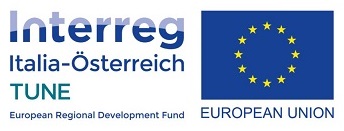 TUNE
TUNE

TUNE
Competenze energetiche senza confini
Municipalities are at the center of the debate on climate protection: within this process many of them in Italy and Austria have decided to use an energy accounting system in order to monitor their consumption. However the used systems are not uniform and the comparison is neither immediate nor easy. The project TUNE aims to be a valuable support for local governments that already work in this fields. The objectives of the project are twofold: on the one hand to provide employees with new skills, on the other to allow cities to compare their energy performance across borders. This will lead to a more efficient and harmonized energy management and it will allow a better planning on investments. If municipalities are more aware of their consumption and work with more competent staff, they will be able to communicate in a more efficient way within the European market and through the use of innovative energy trading tools, such as energy performance contracts and guaranteed partnership between public and private sectors. Language and cultural barriers, which are usually a problem for the harmonization and comparison, will be overcome through training and public events that will allow to share resources and to forge cooperative relations within a cross-border network.
Project partners
- Lead Partner (FVG) Agenzia per l'energia del Friuli Venezia Giulia
- Project partner 1 (FVG) ComPA FVG - centro di competenza per la pubblica amministrazione
- Project partner 2 (BZ) Agentur für Energie Südtirol - KlimaHaus
- Project partner 3 (VEN) Comune di Mogliano Veneto
- Project partner 4 (KAR) Amt der Kärntner Landesregierung - Abteilung 8
Project budget
695.930,23 Euro
Project duration
14.11.2016 - 30.10.2019
Project website
Publications
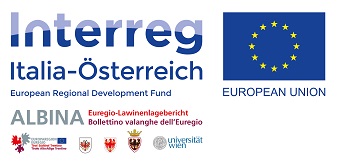 ALBINA
ALBINA

ALBINA
Bollettino valanghe dell'Euregio
The project's main goal is the realization of a joint multilingual avalanche bulletin designed to daily inform citizens about the avalanche situation in the entire Euregio territory. In order to achieve this, the project aims at standardizing the work of the employees through a unified workflow based on EAWS standards for the preparation of the bulletin while organizing apposite periodic training. Communication structures developed within the project will promote and facilitate the exchange of information among experts of the three territories, thanks to a software system that will display the weather station data, observations, snow and avalanche profiles of the whole region and will enable loading of the avalanche bulletin. The exchange of information will occur through standardized interfaces and formats that will facilitate future extensions and connections. The Euregio avalanche bulletin will be presented on the Web site in an intuitive and uniform way thanks to optimized mapping and descriptions based on predefined text blocks. Standardized interfaces with the media and social networks will facilitate the broadcast of the bulletin. All data will be freely accessible thus supporting the Open Data initiative. This first cross-border avalanche bulletin is a decisive step forward in risk prevention and management in the Euregio territory.
Project partners
- Lead Partner (BZ) EVTZ "Euregio Tirolo-Alto Adige-Trentino"
- Project partner 1 (AT) Universität Wien
Project budget
915.700,00 Euro
Project duration
30.10.2016 - 29.03.2019
Project website
.
 HEALTHNET
HEALTHNET

HEALTHNET
Percorsi di cura e assistenza integrata socio-sanitaria a domicilio attraverso il supporto di soluzioni ICT
The HEALTHNET project aims at defining innovative integrated care model and at developing policies shared at cross-border level on home-care for the wellbeing of citizens, through comparative analysis, training and pilot activities implementing ICT- and social innovation. The three involved Regions have already implemented cooperation projects that will feed this new proposal. Starting from the results and lessons learned from the previous experiences, the partners foresee to set-up an institutional cooperation in order to develop transferable and sustainable integrated care models with the following objectives: to improve the integration and continuity between hospital and primary care, to strengthen the capacity of independent living for people with chronic diseases mainly in the post-discharge phases through ICT-solutions (eHealth and eCare) and training activities for formal and informal carers. The project addresses crucial issues of the Italy-Austria Programme area, such as an ageing population with ageing rates higher than the EU average, the reform of health regional systems, the increasing cost of health care.
Project partners
- Lead Partner (FVG) Azienda Sanitaria Universitaria Integrata di Trieste
- Project partner 1 (FVG) Regione Friuli Venezia Giulia - direzione centrale salute, integrazione socio sanitaria, politiche sociali e famiglia
- Project partner 2 (VEN) Azienda ULSS 1 Dolomiti
- Project partner 3 (KAR) Amt der Kärntner Landesregierung - Abteilung 5
Project budget
1.111.707,00 Euro
Project duration
01.01.2017 - 31.12.2019
Project website
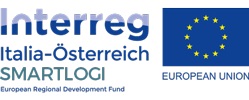 SMARTLOGI
SMARTLOGI

SMARTLOGI
Logistica transfrontaliera sostenibile e intelligente
SMARTLOGI aims to enhance the operational and institutional cooperation on sustainable multimodal freight transport options, tackling the administrative and technological issues currently hindering additional modal shift from road to rail thus decreasing the impact of freight transport in terms of pollution, GHG emissions and noise. This will be achieved through a cross-border action plan (WP3) that will be tested through feasibility studies and joint pilot actions (WP4), leading to the elaboration of a strategy for enhancing cross-border multimodal transport (WP5), that will be adopted both at operational level by PPs and at institutional level by two EGTCs of the Programme Area, for the creation of a long-term crossborder institutional cooperation framework on freight transport. The project’s results will be used by both PPs and by the other logistic nodes (ports / inland terminals) and policy makers at regional and national level. These are also the main target groups of the project, together with terminal and logistic operators. They will be reached both through wide communication means (e.g. press releases, articles, website) but mainly through dedicated activities (e-newsletters and targeted events). SMARTLOGI will make multimodal transport more competitive and attractive, thus increasing the modal shift from road to rail and contributing to the safeguard of the environment of the whole Programme Area.
Project partners
- Lead Partner (FVG) Autorità di Sistema Portuale del Mare Adriatico Orientale
- Project partner 1 (FVG) EVTZ Euregio Ohne Grenzen mbH.
- Project partner 2 (IT) Regione Veneto direzioni trasporti
- Project partner 3 (BZ) Eurac Research
- Project partner 4 (KAR) Universität Klagenfurt
- Project partner 5 (KAR) LCA Logistik Center Austria Süd GmbH
- Project partner 6 (IT) Università Iuav di Venezia
Project budget
1.289.222,57 Euro
Project duration
01.01.2018 - 30.06.2020
Project website
 CaRe
CaRe

CaRe
Un approccio sostenibile al Case & Care management nella regione transfrontaliera
Care Management (CrM) is concerned with the system & care control, which coordinates and organizes across cases and institutions needs oriented support in social- and health care and demonstrates structural prerequisites for it. This superordinate perspective & competence is missing in existing organizational forms of case management (CsM) (e.g. discharge management, CsM mobile care providers) in order to keep the balance between humanity and economics. The aim of the CaRe project is the development, regional piloting and evaluation of a superordinate crossinstitutional CrM office, which serves as a regional contact point & counseling center for the system & care management of elderly people in need of care and their caring relatives. The benefit is demonstrated in the relief to hospitals, outpatient providers, the public sector and funding agencies through the creation of an innovative CrM office that provides sustainable management & coordination of care quality & cost-efficiency. This leads to a regional change in the program area. A cross-border communication campaign provides result dissemination, such as a CaRe web platform, which makes the resulting concepts & services (training curriculum, a.s.o.) known to the public at large. The added value lies in the network of local care providers, networking within the program area & creation of a CrM office, and its planned implementation into standard operation.
Project partners
- Lead Partner (TIR) Private Universität für Gesundheitswissenschaften, medizinische Informatik und Technik (UMIT)
- Project partner 1 (IT) Gemnova GmbH
- Project partner 2 (VEN) IPAB DI VICENZA
- Project partner 3 (FVG) UTI MEDIOFRIULI
- Project partner 4 (FVG) Azienda per l’Assistenza Sanitaria n.3 "Alto Friuli-Collinare-Medio Friuli"
Project budget
996.615,00 Euro
Project duration
01.01.2018 - 30.06.2020
Project website
 SIAA
SIAA

SIAA
L'innovazione sociale - Social Impact for the Alps Adriatic Region (SIAA)
The aim is to generate solutions for major challenges within the cross-border region involving public administration and institutions as well as social entrepreneurs. A cross border advisory board (AB) comprising of relevant stakeholders is established. To raise awareness activities including two rounds of a social business (SB) idea challenge are developed. The framework conditions specific to the cross-border region are analyzed including social challenges, relevant target groups, a SWOT analysis and a Social Entrepreneurship Ecosystem map. This analysis, research of Good practice examples and innovative learning practices supporting the cross-border exchange are used to develop a social entrepreneurship training program with an accompanying acceleration for implementation of social business ideas. Instruments like a business model framework and a self-assessment tool supporting social entrepreneurs in the cross-border region are developed. The four month training & acceleration program is run twice and ends with an event, respectively, to share the developed SB ideas, tools and methods in a multidisciplinary setting open to the crossborder network. At the end a handbook for implementing social entrepreneurship in the Alpe-Adriatic Region is published. The acquired knowledge will be transferred through workshops into the public adminstration system.
Project partners
- Lead Partner (KAR) Universität Klagenfurt
- Project partner 1 (BZ) Freie Universität Bozen
- Project partner 2 (KAR) Fachhochschule Kärnten - gemeinnützige Privatstiftung
- Project partner 3 (KAR) build! Gründerzentrum Kärnten GmbH
- Project partner 4 (VEN) t2i - Technologie Transfer und Innovation s.c. ar.l.
- Project partner 5 (FVG) Friuli Innovazione Centro di Ricerca e di Trasferimento Tecnologico
- Project partner 6 (FVG) Università degli studi di Udine
Project budget
1.127.653,00 Euro
Project duration
01.01.2018 - 30.10.2020
Project website
.
 A21
A21

A21
A21DIGITAL TYROL VENETO
A21DIGITAL TYROL VENETO is a common study project of the Free University of Bolzano, the University of Verona (operativ through Polo Scientifico Didattico Studi sull'impresa, Vicenza) and the digital network A21DIGITAL. The objectives of the study are RELEVANT FUTURE STRATEGIES and RECOMMENDATIONS for decision-makers in Tyrol, South Tyrol and the Veneto regarding opportunities and challenges of digitization. As the future of our common economic macro region is determined by its ability to use digitization as a chance. The study A21DIGITAL TYROL VENETO on the basis of numerous interviews with experts (local and global) should assist politicians and decision-makers to master the digital transformation successfully. In particular by improvement of institutional capacities of public administration in the macro region as well as through enhanced interaction of citizens an institutions. But also topics such as education (e.g. a cross-border training program), crossborder exchange in digital government systems or innovative opportunities for participation of young people will be captured by the study.
Project partners
- Lead Partner (TIR) A21DIGITAL
- Project partner 1 (BZ) Freie Universität Bozen
- Project partner 2 (IT) Universität Verona
Project budget
300.938,25 Euro
Project duration
01.07.2017 - 31.12.2019
 EUMINT
EUMINT

EUMINT
Euroregioni, Migrazione e Integrazione
The EUMINT project aims at strengthening cross-border cooperation between institutions in the Provinces of Blzano and Trento, in the Länder of Tirol and Carinthia, and in the Regions of Friuli Venezia-Giulia and Veneto, in order to tackle social, economic, political and cultural challenges arisen from migration phenomena. Border regions require indeed common and coherent measures in the field of integration policies. The project will involve municipal, provincial/regional and euro-regional institutions in three different spheres: - Institutional integration: the project will promote a direct exchange of experiences between project partners through field visits, a "laboratory of ideas" and a series of recommendations for multilevel institutions operating in the field of integration; - Civic integration: in view of transferring its results to different institutions and territories, the project will train new professional figures in the field of welfare and social care through the development of innovative didactic material with the aim of sensitizing asylum-seekers and refugees to common European values; - Labour integration: thanks to a participative process, the project will lay the foundations for the development of specific short- and medium-term measures and instruments, as well as long-term strategies and policies, for the integration of asylum-seekers and refugees in the labour market.
Project partners
- Lead Partner (BZ) Eurac Research
- Project partner 2 (TIR) Zentrum für MigrantInnen in Tirol (ZeMiT)
- Project partner 3 (TIR) Universität Innsbruck
- Project partner 4 (FVG) EVTZ Euregio Ohne Grenzen mbH.
- Project partner 5 (BZ) Bezirksgemeinschaft Burggrafenamt
- Project partner 7 (BZ) Bezirksgemeinschaft Salten-Schlern
- Project partner 8 (BZ) Bezirksgemeinschaft Eisacktal
- Project partner 9 (BZ) Bezirksgemeinschaft Vinschgau
- Project partner 11 (TIR) Regionalmanagement Wipptal
- Project partner 12 (FVG) ARLeF
Project budget
1.174.728,79 Euro
Project duration
01.01.2018 - 02.07.2020
Project website
 SILLABUS
SILLABUS

SILLABUS
Percorsi di integrazione delle persone con disabilità, attraverso l'abbattimento delle barriere architettoniche, sociali e culturali
The SILLABUS aims, through a comparative analysis, training and trial, to define new pioneer models in order to achieve shared policies in social and healthcare matters in the Italy-Austria cross-border area. Moreover it aims to support, enhance and develop the basic conditions for the social inclusion of people with disabilities, focusing on life’s aspects such as spare time, culture, nature, tourism and work as well. Taking into account the UN convention on the rights of people with disability, followed by the European Strategy on disability 2014-2020 adopted by the European Commission in 2010, the partners representing the three areas aim to establish an institutional cooperation developing and sharing integrated models to support the active inclusion of the people with disability contributing the achievement of the Targets sat by the UN 2030 Agenda on sustainable development of the areas (Goals 8,10,11) . This contribution lies in the capacity and expertise on the development of employment models, as well as the removal of cultural and social barriers of the AULSS1 and Province of Belluno on one hand and the expertise and skills on barrier-free access in order to make services and goods more accessible for people with disability of RegioL and municipality of Asiago on the other one.
Project partners
- Lead Partner (VEN) Azienda ULSS n.1 Dolomiti
- Project partner 1(TIR) RegioL Regionalmanagement Landeck
- Project partner 2 (VEN) Amministrazione provinciale di Belluno
- Project partner 3 (VEN) Comune di Asiago
Project budget
612.057,00 Euro
Project duration
01.01.2018 - 30.06.2020
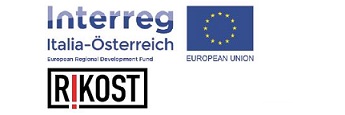 RiKoST
RiKoST

RiKoST
Strategie per la comunicazione del rischio
The concept of risk management includes a wide range of measures, which deal with natural hazards and which are divided into different topics such as prevention, protection, preparation, event management and reconstruction. A correct risk perception in the population and an efficient communication of risks, build up an important starting point to deal with natural hazards. The main objective of the project is the improvement of the collaboration between institutions and the population on the communication about the risk regarding natural hazards. It is in fact necessary to increase the awareness in the population, through the development of specific communication tools. To this purpose the current status shall be surveyed at first and then good practice examples will be collected; these will be used to plan interviews and analysis of the needs concerning the different stakeholders and to develop tailor-made communication tools, such as a web platform. The activities to rise resilience will be completed by measures about the development of awareness for actors involved in risk management. Within the improvement of the risk awareness in border zones such as South Tyrol and Carinzia, particular importance will be given to the presence of different languages, to gender mainstreaming and to socio-cultural aspects. The continuous exchange of information will build up a multiplier of the project results, which will be available to all the active subjects within the risk management.
Project partners
- Lead Partner (BZ) Agenzia per la protezione civile
- Project partner 1 (BZ) Eurac Research
- Project partner 2 (KAR) Amt der Kärntner Landesregierung - Abteilung 12 - Wasserwirtschaft
Project budget
819.623,55 Euro
Project duration
01.11.2017 - 31.10.2020
Project website
.
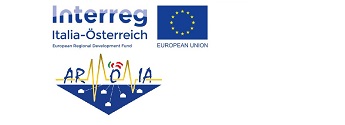 ARMONIA
ARMONIA

ARMONIA
Rete di monitoraggio accelerometrico in tempo reale di siti ed edifici in Italia ed in Austria
The ARMONIA project aims to tighten collaboration between the civil protection institutions for the risk prevention. Through the use of innovative methodologies, it develops a trans-frontier strategy in the management of natural disasters. On the cross border area natural disasters, as strong earthquakes, causes damages and loss of life in different countries. The development of common protocols allows joint planning and implementation of harmonize actions to accelerate and facilitate the rescue operations. Partners will develop an innovative seismic monitoring system extended also to the strategic buildings that will provide critical information, in the cross-border area, crucial for a rapid and focused interventions at the occurrence of earthquake. Tools for data analysis, as real time cross-border thematic maps, will be developed, for operative rooms to have an immediate evaluation of the damages distribution. The realization of a homogeneous trans-frontier management model of risk prevention will help the civil defence institutions and regional government prepare plans to protect the population, mitigate the earthquake damages. The realization of common protocols for the training and joint exercises of civil defense volunteers and citizen will help to improved coordination of cross border interventions and a fast emergency actions.
Project partners
- Lead Partner (FVG) Istituto nazionale di oceanografia e di geofisica sperimentale - OGS
- Project partner 1 (FVG) Università degli studi di Udine
- Project partner 2 (FVG) Università degli Studi di Trieste
- Project partner 3 (FVG) Regione Autonoma Friuli Venezia Giulia - Protezione civile della Regione
- Project partner 4 (IT) Region Veneto - Direktion für Bevölkerungsschutz und der lokalen Polizei
- Project partner 5 (AT) Zentralanstalt für Meteorologie und Geodynamik (ZAMG)
- Project partner 6 (TIR) Universität Innsbruck
Project budget
1.114.575,00 Euro
Project duration
01.01.2018 - 30.06.2020
Project website
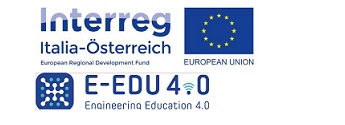 E-EDU 4.0
E-EDU 4.0

E-EDU 4.0
NETWORK TRANSFRONTALIERO DI FORMAZIONE 4.0
The Industrial revolution n4is on progress: Schools, Universities and SMEs are fully involved to provide necessary skills and innovation processes. The Alpine Area is involved and several local and EU actions are addressing this challenging topic. The transboarder area interested by E-EDU4.0 is on this topic with assistance and services provided by local intermediaries to SMEs, but needs additional efforts to provide necessary skills both for the educational programmes for Schools and Universities and the training actions addressed to SMEs. E-EDU4.0aims to support the Industry 4.0 process strengthening the impact of training and educational programmes with a much more effective transboarder cooperation and a better synergy concerning training and educational programmes from one side, laboratories and didactic infrastructures from the other. The project builds necessary networks of actors dealing with skills and learning programmes, organize their activities and provide necessary tools and necessary equipment to complete the instruments and the infrastructures available for the learning process both at local and transnational level. The concrete testing of the qualification programmes with local and transboarder actions addressed to SMEs and students will improve the project impact and open to new synergies and transferring actions. An overall platform with materials and mapping will support the networking, the cooperation and the durability of the project actions undertaken
Project partners
- Lead Partner (VEN) Camera di Commercio Industria artigianato agricoltura di Treviso Belluno
- Project partner 1 (KAR) HTL Wolfsberg
- Project partner 2 (KAR) Fachhochschule Kärnten - gemeinnützige Privatstiftung
- Project partner 3 (FVG) Friuli Innovazione Centro di Ricerca e di Trasferimento Tecnologico
- Project partner 4 (VEN) t2i - Technologie Transfer und Innovation s.c. a r.l.
- Project partner 5 (BZ) Freie Universität Bozen
Project budget
1.151.369,63 Euro
Project duration
01.05.2018- 31.10.2020
 SCET-NET
SCET-NET

SCET-NET
Senza Confini Education and Training Network
The main goal is to promote ongoing institutional cooperation to coordinate the legal and legislative framework of training for the definition of educational models launching cross-border exchanges for students and interns over 16, with a view to recognising skills and adopting common, replicable and sustainable organisational practices. This project focuses on the analysis, design and testing of common training models/courses that can improve and increase employment opportunities for the youth, thus spurring the economic development of the Area. It will be divided into different steps: a comparative analysis of existing systems, a pilot phase of exchanges for some training courses and a final step of summary/assessment for the adoption of common procedures in designing and managing cross-border training courses. Scet-NET will also organise an information, awareness-raising and promotion campaign for all targeted stakeholders (schools, students/youth and companies) and will set up a bilingual virtual platform. The various deliverables such as studies, methods and documents in two languages will provide rich know-how for all. That will be the basis for the signature of institutional agreements which, together with the feasibility study on a cross-border exchange management structure, will be the project outputs.
Project partners
- Lead Partner (FVG) GECT Euregio Senza Confini r.l.
- Project partner 1 (KAR) Landesschulrat für Kärnten
- Project partner 2 (KAR) Wirtschaftskammer Kärnten
- Project partner 3 (FVG) Camera di Commercio Industria Artigianato e Agricoltura Venezia Giulia
Project budget
1.161.088,60 Euro
Project duration
01.01.2018 - 30.09.2020
Project website
 EFP
EFP

EFP
EuregioFamilyPass: Vantaggi/servizi/offerte senza confini per le famiglie nell'Euregio Tirolo-Alto Adige-Trentino
Family policies are the focus of attention in Tyrol, South Tyrol and Trentino. Significant efforts have been made in recent years to create adequate conditions for the development of the family as the key of society. Measures have been carried out in the field of social security and childcare services, as well initiatives aimed at guaranteeing families an easy access to recreational facilities, mobility services, shopping, etc. For this purpose, over the last few years each one of the three territories has introduced its own family card. In the framework of the EuregioFamilyPass project, shared approaches are developed in order to further strengthen family policies by integrating existing family card systems into a single EuregioFamilyPass. This allows Euregio families to benefit from additional advantages across the entire Euregio area. This will increase mobility of entire families, while making national and regional boundaries therefore irrelevant.
Project partners
- Lead Partner (BZ) EVTZ "Euregio Tirolo-Alto Adige-Trentino"
Project budget
978.400,00 Euro
Project duration
02.11.2017 - 30.10.2020
Project website
www.europaregion.info/de/interreg-projekt-euregiofamilypass.asp
.
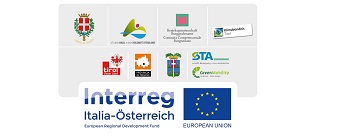 PRO-BYKE
PRO-BYKE

PRO-BYKE
PRO-BYKE Promozione transfrontaliera della mobilità ciclabile nei comuni
The objectives of the PRO-BYKE projects concern the definition of quality measures and standards for the future harmonized and standardized coaching of cycling between Italy and Austria and the increasing of the use of bicycles in the analyzed model regions. In order to increase the percentage of cycling mobility and thus to promote national and international climate protection goals, it is essential to implement a policy framework for the promotion of cycling mobility. The aim of the project is to harmonize and professionalize the promotion of cycling mobility in the territories involved, intensifying the cross-border cooperation of the regions, provinces and municipalities through the implementation of pilot measures at local level. To achieve this, model cycling consultations will be carried out in the model regions to develop various experimental measures, evaluating and discussing the results obtained in all regions involved in the project. Based on the notions thus obtained, guidelines and local governance policies will be developed to create a solid foundation for promoting sustainable cycling mobility over time. Signing a Memorandum of Understanding between the regions involved will provide the basis for the future cooperation of the regions on the theme.
Project partners
- Lead Partner (VEN) Comune di Vicenza
- Project partner 1 (TIR) Klimabündnis Tirol
- Project partner 2 (BZ) Bezirksgemeinschaft Burggrafenamt
- Project partner 3 (FVG) UTI Valli e Dolomiti friulane
Project budget
927.456,05 Euro
Project duration
01.01.2018 - 31.07.2020
Project website
 START
START

START
Test intelligenti per tecnologie e tecniche di soccorso alpino (Smart Test for Alpine Rescue Technology)
The project "Smart Test of Alpine Rescue Technology" (START) with seven partners form four provinces and federal states is planned from 2017 to 2020. The Lead partner is the Österreichische Bergrettung Land Tirol. The project partners are Soccorso Alpino e Speleologico Alto Adige CNSAS, Soccorso Alpino dell’Alpenverein Südtirol, Azienda ULSS n.1 Dolomiti, IDM Südtirol, University Klagenfurt, EURAC Research and as associated partner Österreichische Bergrettung Landesorganisation Kärnten. The project deals with the strengthening of the cross-border institutional cooperation and alpine rescue technologies that are treated and worked on in six work packages. Objectives of the project are 1. Strengthening cross-border cooperation of mountain rescue and coordination of cross-border emergencies 2. Development of common methods for the introduction of new technologies and procedures 3. Creation of a pilot area for testing innovative technologies and related operational protocols 4. Development of IT applications and IT support to better help people in need faster in emergency in the Alps but also a sustainable cooperation of the mountain rescue in the border area and for joint international missions as well as collaboration for an aeffective (cost riduction) adaptation and testing of new technologies for the optimization of the alpine rescue chain beyond the project duration.
Project partners
- Lead Partner (TIR) Österreichische Bergrettung Land Tirol
- Project partner 1 (BZ) Südtiroler Berg- und Höhlenrettung CNSAS
- Project partner 2 (BZ) Bergrettungsdienst im Alpenverein Südtirol
- Project partner 3 (VEN) Azienda ULSS n.1 Dolomiti
- Project partner 4 (BZ) IDM Suedtirol - Alto Adige
- Project partner 5 (KAR) Universität Klagenfurt
- Project partner 6 (BZ) Eurac Research
Project budget
973.256,69 Euro
Project duration
30.10.2017 - 30.10.2020
Project website
 Fit4Co
Fit4Co

Fit4Co
Fit for Cooperation
This project’s main objective is the strengthening of integration and cross-border issues on "regional thinking" and “regional mainstream”. This way, EGTC and INTERREG pursue the same goal, to succeed in rooting in everyone's minds the meaning of cooperation, while expanding the horizons. Collaborators / district officials should be adequately trained in a cross-border collaboration approach: they will have to be able to understand the benefits and use the available tools. In order to reach this goal, some means will have to be developed. On the one hand, it is necessary to widen the competence on the EU, on the other hand, language barriers must be overcome through specific language training courses. Recipients: Public administrations in the territory of the EGTC "Euregio Tyrol-South Tyrol-Trentino" and EGTC Euregio Without Borders: - Offices of the Regions, Austrian Länders, Italian Autonomous Provinces - city councils and municipal administrations - administrations of public entities (universities, territorial communities, municipal consortia, etc.) - Chambers of commerce and labor - possibly entities belonging to public property with public service obligations (hospitals, energy companies, etc.) - possibly state administrations (State Police, etc.) The results of "FitCo" will be a series of professionally elaborated cooperation projects, they could then be directly implemented onto the program area or presented in future European calls.
Project partners
- Lead Partner (BZ) EVTZ "Euregio Tirolo-Alto Adige-Trentino"
- Project partner 1 (FVG) EVTZ Euregio Ohne Grenzen mbH.
Project budget
994.600,00 Euro
Project duration
02.11.2017 - 30.10.2020
Project website
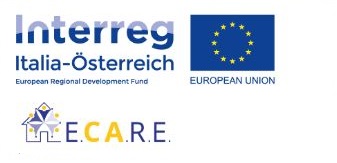 E.CA.R.E.
E.CA.R.E.

E.CA.R.E.
Elderly home care Residential Engagement (Soziales Engagement und Unterstützung für Senioren zuhause und im betreuten Wohnen)
The goal of the ECARE project is to reduce the social isolation and the psychological, physical and relational difficulties of older people living in their own home or in a home provided by the public administration. The intervention model foreseen by ECARE is based on community involvement (neighbors, friends, relatives) and the creation of new relationships and common interests. Participating seniors will be accompanied on a path to improving their lifestyle from a risk assessment practitioner's assessment to areas of relevance to their social relationships and their health, particularly nutrition, Physical activity, cognitive stimulation, and sensory stimulation. The basis of the experimentation is the use of a digital application system to support different terminals, including a smartwatch that allows a smart link between the elder and the people of his community. Along with this link, the platform allows you to monitor the lifestyle improvement in its various components and, above all, the ability to pursue it continuously, identifying a path of continuous improvement. Validation of results will be based on specific quality of life indicators, on cost-benefit analysis and on the effect of reducing spending on social and health services delivery.
Project partners
- Lead Partner (VEN) ISTITUTO PER SERVIZI DI RICOVERO E ASSISTENZA AGLI ANZIANI
- Project partner 1 (FVG) A.S.P. UMBERTO I
- Project partner 2 (VEN) SER.S.A. Sozial und Wohlfahrtsdienste
- Project partner 3 (KAR) Universität Klagenfurt
Project budget
810.864,78 Euro
Project duration
01.01.2018 - 31.08.2020
Project website
.
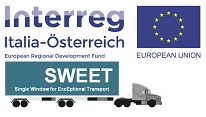 SWEET
SWEET

SWEET
The Single Window for ExcEptional Transport
The project SWEET is relevant to the promotion of an improved governance of the exceptional transport in the Program area and is based on the introduction of an integrated concept of mobility and logistic. For this type of transports, exemption or permit is needed prior to carrying out an abnormal road transport operation by the authorities. Rules and process varies from Member State to Member State or sometimes even from region to region resulting in delays and difficulties by the carries and the authorities. The existing available regional tools in the programme area are not interoperable and do not allow the sharing of information. Other functions are required to be improved for a better governance. The main objective is the study and implement a common solution, taking into consideration the existing EU guidelines and requirements from stakeholders. The Sweet solution will allow a single windows approach, interoperability with the existing solution available, new functionality to simplify the authorization process and to provide real time monitoring for an improved governance. Corridors will be jointly clearly defined, especially for the cross border. A legal analysis will be carried out to harmonize and improve the logistic sector relevant to this transport. We expect an overall cost and time reduction for getting the authorization, an improved safety and transport governance.
Project partners
- Lead Partner (IT) Regione del Veneto - Direzione Infrastrutture e Trasporti
- Project partner 1 (KAR) Universität Klagenfurt
- Project partner 2 (VEH) Veneto Strade SPA
- Project partner 3 (FVG) Friuli Venezia Giulia Strade SpA
Project budget
797.837,92 Euro
Project duration
01.01.2020 - 31.03.2022
 SAR
SAR

SAR
Alleanza per lo sviluppo dello spazio sud-alpino
The developement of the southern alpine area had a slow progress in the last years. Meanwhile the human potential is missing. There are two different factors, which are decisive when people choose their place to live: Hard facts and emotional incitements like family, friends, landscape and values lived in place. The project encompasses both, emotional incitements and hard facts. Content of the project is to bring the peripher areas of Carinthia, Tyrol and South Tirol, including the cities of Spittal, Hermagor, Lienz and Bruneck, together to a common platform/brand/presence. The project is the strategic and organisational startingpoint to enhance the status of the southern alpine area and to align it in a future oriented manner. The project traces the following strategic approaches: • A clear positioning and communication of the area as a livable contrastpoint to the agglomerations of Bozen, Innsbruck and Klagenfurt. • Development of at least 3 topics, which will be traced along the axis of Spittal/Hermagor – Lienz – Bruneck. The idea is to follow and present topics like higher education, mobility and value added chains. • Work together on the topic of stay & come (keyword: human potential). The spatial focus will be set on the axis of Spittal/Hermagor – Lienz – Bruneck. This is the axis with the strongest connections regarding traffic and several other functions.
Project partners
- Lead Partner (TIR) Regionsmanagement Osttirola
- Project partner 1 (BZ) Lokale Aktionsgruppe Pustertal
Project budget
156.060,00 Euro
Project duration
30.01.2019 - 30.06.2021
SedInOut
SedInOut
Sviluppo di una metodologia di gestione del rischio tramite la valutazione della disponibilità di sedimento al trasporto in massa in ambiente montano
Mass wasting is a threat to residential areas and infrastructure, causing widespread destabilization in alpine stream channels, also in relation to ongoing climatic changes. Although hillslope sediment supply represents a critical factor for stream channel stability during heavy rainstorms, there is a general lack of procedures for quantifying sediment availability and composition. Moreover, we lack validated empirical models for estimating hillslope sediment flux to the drainage network as a function of meteorological forcing. This gap is mainly due to the high variability of existing topographic and geological data across regions, as well as to a deficit in transnational networking. SedInOut, through a joint international effort, aims to develop methodologies for the quantification and characterization of sediment on the hillslopes, towards a sustainable land management that values geo-risk mitigation and sediment recycling. The project starts with a remotely based analysis of the entire partners’ territory to identify a set of representative study sites (WP3). At these sites, we will develop a set of data collection and data analysis methodologies for the: 1) quantification (WP4) and characterization (WP5) of readily available sediment; 2) evaluation of hillslope sediment delivery to streams (WP6); 3) preparation of relevant manuals and guidelines (WP7), which will be disseminated on a dedicated website, in public workshops, training courses and scientific publications.
Project partners
- Lead Partner (BZ) Autonome Provinz Bozen - Amt für Geologie und Baustoffprüfung
- Project partner 1 (IT) Regione del Veneto - Direzione Difesa del Suolo
- Project partner 2 (FVG) Regione autonoma Friuli Venezia Giulia - Direzione centrale ambiente ed energia - Servizio geologico
- Project partner 3 (SBG) Amt der Salzburger Landesregierung - Abteilung 6 Infrastruktur und Verkehr
- Project partner 4 (KAR) Amt der Kärntner Landesregierung - Abteilung 8
Project budget
961.700,00 Euro
Project duration
01.07.2019 - 31.03.2022
 TINIA
TINIA

TINIA
Bollettino meteorologico per l’Euregio
The weather and its precise forecasts are becoming increasingly important for the population of Euregio Tyrol-South Tyrol-Trentino. Civil protection aspects are as important as the necessary information on climate development for the individual citizen as well as for tourism and for the economy in general. In order to simplify the situation of the population of the Euregio, a project has been launched that will offer a cross-border and joint meteorological presence for the three territories Tyrol, South Tyrol and Trentino on its own web platform.
Project partners
- Lead Partner (BZ) EVTZ "Euregio Tirolo-Alto Adige-Trentino"
- Project partner 1 (AT) Zentralanstalt für Meteorologie und Geodynamik (ZAMG)
Project budget
499.185,00 Euro
Project duration
01.09.2019 - 31.03.2022
.
 INADEF
INADEF

INADEF
Sistema d’allarme INnovativo per eventi di colAta DEtritica basato su previsioni a breve termine e Fenomenologia
Debris flows are rapid, gravity-induced mass movements consisting of water-sediments mixture that route along channels incised on mountain slopes. In the Alps, the main factors triggering these phenomena are extreme rainfall events that cause abundant runoff which entrain large quantity of debris forming solid-liquid surges that route downstream destroying or damaging each obstacle (houses, works) they meet, causing also death of people. The increase of extreme rainfalls likely due to the climate change, increased the frequency of these phenomena. The mostly short duration of the rainfalls triggering debris flows (10-30 minutes), the short times (5-15 minutes) of their downstream routing forbids the use of standard rainfall forecasting for their predictability as for flash floods and landslides. Moreover, early-warning systems based on sensors detect the debris flow transit and allow only short alert times. The project's aim is to provide an early-warning system that increases the alert time. The proposed system is based on a models cascade: nowcasting, hydrological and triggering models. Nowcasting anticipates rainfall pattern (1-3h) that is transformed into runoff by the hydrological model. The triggering model estimates the sediments volume that the runoff can entrain, and compares it with a critical threshold. If this is exceeded the alert is launched. This new system will be tested by monitoring stations in sites frequently subject to debris flows in all the regions.
Project partners
- Lead Partner (FVG) Università degli Studi di Udine - Dipartimento di Scienze AgroAlimentari, Ambientali e Animali - DI4A
- Project partner 1 (VEN) ARPAV Agenzia Regionale per la Prevenzione e Protezione Ambientale del Veneto
- Project partner 2 (IT) Università degli Studi di Padova
- Project partner 3 (AT) Bundesforschungszentrum für Wald (BFW)
- Project partner4 (AT) Zentralanstalt für Meteorologie und Geodynamik(ZAMG)
Project budget
869.122,70 Euro
Project duration
01.09.2019 - 28.02.2022



